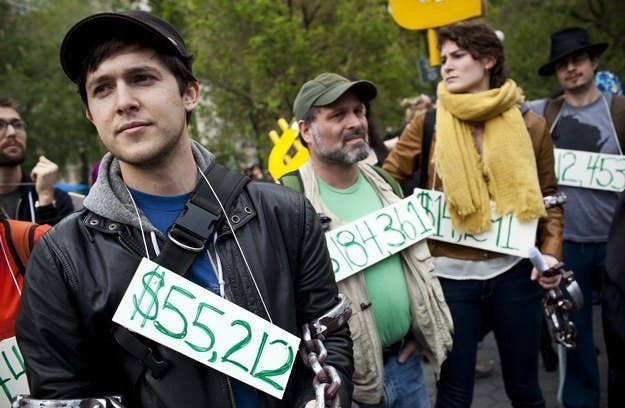
A new report suggests that private debt collectors are incentivized by the government to act against the interests of student loan borrowers struggling to pay back their debts.
The report, released today by the National Consumer Law Center (NCLC), claims that the $1 billion per year partnership between the Education Department and private loan collectors leads to abuse and hurts students borrowers because of its ratings system and compensation structure for debt collection.
When students default on their federal loans, the Education Department outsources collection duties to one of 22 different private agencies, which are tasked both with collecting the money and informing borrowers about their options to resolve the debt. Because those private agencies are driven by profit, the NCLC report says, they often act in their own financial interests, rather than those of borrowers.
"Debt collection agencies' job is to collect money, not to help oversee a complex administrative system like the federal loan system," said Persis Yu, an NCLC attorney and one of the study's authors. "Matching borrowers with the right program is something that is not in the scope of what debt collection does."
Under their partnership, the government pays sizable, percentage-based commissions to debt collection agencies if borrowers pay down their balances or have their wages garnished, but pays out only small administrative fees if borrowers switch to income-based repayment plans or have their loans cancelled because of disabilities. As a result, the system creates a financial incentive for debt collection companies to ensure borrowers' loan payments are as high as possible since they collect a 16% fee on the loan payments made. The system also makes it less likely that borrowers receive services like disability or bankruptcy discharges, the report said, because debt collectors receive just $150 for those services.
One borrower cited in the NCLC report, for example, claimed to be misled by a debt collection agency about her eligibility to have her loan discharged because of her disability. Instead of helping her apply for discharge, a debt collection agency encouraged her to make payments on her loan, for which the agency would have received a percentage-based fee, she said.
There is strong evidence that the government's incentives-based system can make a big difference in how debt collectors behave, according to the report. In 2012, the Department changed a part of the incentive policy that had made it far less financially lucrative for debt collectors to arrange loan rehabilitation for borrowers. That change led to far more people enrolling in loan rehabilitation programs.
The report also critiques the system the Education Department uses to rate debt collection agencies and thereby award them bonuses and contracts. The ratings are mostly determined by the amount that agencies can collect, and fail to take into account real metrics of borrowers' experience with agencies, such as consumer complaints. That has led to some troubled, complaint-ridden debt collection agencies receiving huge federal bonuses — like the NCO Group, a subsidiary of a debt-collection agency that was charged with a host of consumer violations by the FTC. The NCO Group paid out the largest settlement with a debt-collection agency in FTC history after it was accused of harassing consumers with multiple phone calls at all hours of the day and disclosing their information without permission to third parties. Yet NCO is one of the Education Department's highest-rated agencies, the report says.
"It was absolutely shocking to us that the department essentially doesn't take borrower experience into consideration," Yu said.
This is not the first report to take issue with the government's partnership with debt collection agencies. Earlier this year, investigations by the Government Accountability Office and the office of the Inspector General found that oversight of the agencies was flawed, failing to monitor borrower complaints or to correct numerous documented abuses by private debt collection agencies who receive lucrative government contracts.
